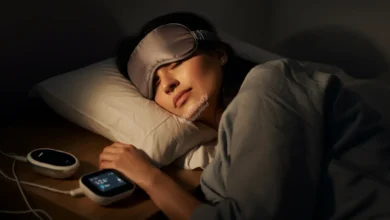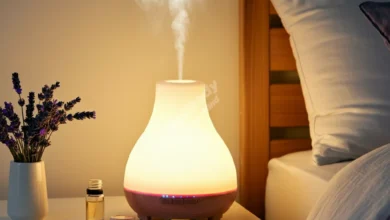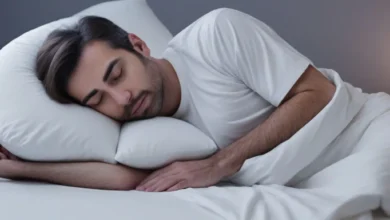How Do Anti-Snore Devices Work, and Can They Improve Sleep?

Did you know that snoring affects nearly 90 million American adults, with 37 million experiencing regular, disruptive snoring? This nighttime nuisance not only affects the snorer but can also significantly impact their partner’s sleep quality. As people increasingly seek solutions for better sleep, anti-snore devices have gained popularity as a potential remedy.
In this post, we’ll explore how these innovative snoring solutions work and whether they can truly improve your sleep. We’ll dive into the different types of anti-snore devices available, their effectiveness, and how to choose the right one for you. So, if you’re ready to breathe easier and sleep better, let’s uncover the world of anti-snore devices together!
Understanding Snoring

Snoring is the loud, harsh sound that occurs when air flows past relaxed tissues in your throat, causing them to vibrate as you breathe. While it might seem harmless, snoring can significantly impact sleep quality for both the snorer and their partner.
Common causes of snoring include:
- Obesity or excess weight
- Nasal congestion or allergies
- Alcohol consumption before bedtime
- Sleep position (especially back sleeping)
- Age-related muscle relaxation
- Anatomical features like a deviated septum or enlarged tonsils
Snoring affects sleep quality in several ways:
- Disrupted sleep patterns: Snoring can cause frequent awakenings throughout the night, leading to fragmented sleep.
- Reduced oxygen levels: In some cases, snoring may be a sign of sleep apnea, which can cause dangerous drops in blood oxygen levels.
- Daytime fatigue: Poor sleep quality due to snoring often results in daytime sleepiness and decreased cognitive function.
- Relationship strain: A snoring partner can significantly disrupt the other person’s sleep, potentially leading to relationship issues.
Understanding the causes and effects of snoring is crucial in appreciating how anti-snore devices work to improve sleep. These devices aim to address the root causes of snoring, offering hope for better rest and improved overall health.
Types of Anti-Snore Devices

There are several types of anti-snore devices available, each designed to address different causes of snoring. Let’s explore the most common ones:
Nasal Devices
Nasal devices are designed to improve airflow through the nasal passages. They work by either opening the nostrils or reducing nasal congestion.
| Pros | Cons |
|---|---|
| • Easy to use | • May cause nasal irritation |
| • Non-invasive | • Not effective for mouth snorers |
| • Affordable | • Can fall out during sleep |
| • Portable | • May not work for severe snoring |
Mandibular Advancement Devices (MADs)
MADs are mouthpieces that move the lower jaw slightly forward, helping to keep the airway open during sleep.
- Custom-fit MADs: Professionally made to fit your mouth
- Over-the-counter MADs: One-size-fits-all or adjustable options
Benefits of MADs:
- Highly effective for many snorers
- Can help with mild to moderate sleep apnea
- Long-lasting solution
Potential drawbacks:
- May cause jaw discomfort or tooth movement
- Require a period of adjustment
- Can be more expensive, especially custom-fit options
Tongue Retaining Devices (TRDs)
TRDs work by holding the tongue forward, preventing it from falling back and blocking the airway during sleep.
| Advantages | Disadvantages |
|---|---|
| • Effective for tongue-based snoring | • Can cause tongue soreness |
| • Less jaw discomfort than MADs | • May increase drooling |
| • Suitable for people with dentures | • Can be uncomfortable at first |
Positional Therapy Devices
These devices encourage side sleeping, which can reduce snoring for those who primarily snore when lying on their back.
- How they work: Vibrate or alarm when you roll onto your back
- Effectiveness: Very helpful for positional snorers
- Considerations:
• May disrupt sleep initially
• Requires consistent use to form new sleep habits
Smart Anti-Snore Pillows
These high-tech pillows use sensors and adjustable air chambers to optimize head position and reduce snoring.
| Pros | Cons |
|---|---|
| • Comfortable and non-invasive | • More expensive than traditional pillows |
| • Can adjust throughout the night | • May require power source |
| • Often come with sleep tracking features | • Effectiveness can vary |
Each of these anti-snore devices offers unique benefits and potential drawbacks. The best choice depends on the individual’s specific snoring patterns and preferences.
How Anti-Snore Devices Improve Sleep

Anti-snore devices can significantly enhance sleep quality for both snorers and their partners. Here’s how these snoring solutions contribute to better sleep:
Reduction of Snoring Intensity and Frequency
- Anti-snore devices work to keep airways open, reducing the vibrations that cause snoring.
- Many users report a dramatic decrease in snoring volume and occurrence.
- This reduction can lead to fewer sleep disruptions throughout the night.
Impact on Sleep Quality for the Snorer
- By minimizing snoring, these devices help maintain consistent sleep cycles.
- Users often experience deeper, more restorative sleep.
- Less frequent awakenings mean more time spent in crucial sleep stages.
Benefits for Sleep Partners
- Partners of snorers often report significant improvements in their own sleep quality.
- Reduced noise disturbances lead to fewer partner-initiated wake-ups.
- This can result in better relationship satisfaction and reduced sleep-related conflicts.
Potential Improvements in Daytime Alertness and Overall Health
- Better sleep quality often translates to improved daytime functioning.
- Users may experience:
• Enhanced cognitive performance
• Increased energy levels
• Improved mood and emotional regulation - Long-term use may contribute to better overall health, as quality sleep is crucial for various bodily functions.
Addressing Underlying Health Concerns
- Some anti-snore devices, particularly MADs, can help manage mild to moderate sleep apnea.
- By improving breathing during sleep, these devices may reduce risks associated with sleep-disordered breathing.
It’s important to note that while anti-snore devices can be highly effective, their impact can vary from person to person. Consistent use and finding the right device for your specific needs are key to experiencing these sleep improvements.
Choosing the Right Anti-Snore Device

Selecting the most suitable anti-snore device is crucial for effectively addressing your snoring issues. Here are some key factors to consider:
- Type of Snoring: Identify whether you’re a nose, mouth, or throat snorer.
- Severity of Snoring: Consider how loud and frequent your snoring is.
- Comfort Level: Choose a device you’re likely to use consistently.
- Budget: Anti-snore devices range from affordable to premium options.
- Existing Health Conditions: Some devices may not be suitable for certain conditions.
Importance of Consulting a Healthcare Professional
Before choosing an anti-snore device, it’s highly recommended to consult with a healthcare professional. They can:
- Diagnose the underlying cause of your snoring
- Rule out more serious conditions like sleep apnea
- Recommend the most appropriate device based on your specific needs
- Provide guidance on proper usage and care of the device
Tips for Adjusting to Using an Anti-Snore Device
- Start Slow: Begin by wearing the device for short periods during the day to get used to it.
- Be Patient: It may take a few weeks to fully adjust to sleeping with the device.
- Maintain Proper Hygiene: Clean your device regularly according to manufacturer instructions.
- Monitor Progress: Keep a sleep diary or use a sleep tracking app to assess improvements.
- Communicate with Your Partner: Get feedback on changes in your snoring patterns.
- Follow Up: Schedule regular check-ups with your healthcare provider to ensure the device remains effective.
Remember, finding the right snoring solution might involve some trial and error. Don’t get discouraged if the first device you try isn’t perfect – there are many options available to help improve your sleep.
Limitations and Considerations

While anti-snore devices can be effective snoring solutions, it’s important to be aware of their limitations and potential side effects:
Potential Side Effects of Anti-Snore Devices
- Jaw Discomfort: Mandibular Advancement Devices (MADs) may cause temporary jaw soreness or altered bite alignment.
- Dry Mouth: Some devices can lead to increased mouth breathing, resulting in dry mouth or throat irritation.
- Dental Issues: Long-term use of certain mouthpieces might cause slight changes in tooth position.
- Nasal Irritation: Nasal devices can sometimes cause discomfort or irritation in the nostrils.
- Sleep Disruption: Initially, the presence of a device might interfere with falling asleep or staying asleep.
When to Seek Medical Advice for Snoring
It’s crucial to consult a healthcare professional if:
- Your snoring is loud and frequent
- You experience daytime fatigue despite sufficient sleep
- You wake up gasping or choking
- Your partner notices pauses in your breathing during sleep
These symptoms could indicate sleep apnea, a serious condition requiring medical attention.
Importance of Addressing Underlying Causes of Snoring
Anti-snore devices are often most effective when used in conjunction with addressing root causes:
- Weight Management: Excess weight can contribute significantly to snoring.
- Alcohol Reduction: Limiting alcohol intake, especially before bedtime, can reduce snoring.
- Sleep Position: Training yourself to sleep on your side can help reduce snoring.
- Allergies and Congestion: Treating these issues can improve nasal airflow and reduce snoring.
Remember, while anti-snore devices can provide relief, they’re not a cure-all solution. Addressing underlying factors and maintaining overall health are crucial for long-term snoring management and sleep improvement.
Complementary Approaches to Reduce Snoring

While anti-snore devices can be effective, combining them with lifestyle changes and good sleep habits can significantly enhance their impact. Here are some complementary approaches to help reduce snoring and improve sleep quality:
Lifestyle Changes
- Weight Management: Losing excess weight can reduce pressure on your airways.
- Regular Exercise: Improves muscle tone, including in your throat.
- Quit Smoking: Smoking irritates the airways and increases snoring risk.
- Limit Alcohol: Avoid alcohol at least 3 hours before bedtime.
- Stay Hydrated: Proper hydration helps keep nasal passages and soft palate moist.
Sleep Hygiene Tips
- Consistent Sleep Schedule: Go to bed and wake up at the same time daily.
- Optimal Sleep Environment:
- Keep your bedroom dark, quiet, and cool
- Use comfortable, supportive pillows and mattresses
- Elevate Your Head: Use an extra pillow or adjust your bed to slightly elevate your head.
- Side Sleeping: Train yourself to sleep on your side to reduce snoring.
- Avoid Heavy Meals: Don’t eat large meals close to bedtime.
Other Non-Device Interventions
- Nasal Strips or Dilators: Can help improve nasal airflow.
- Throat Exercises: Strengthen muscles in the upper airway.
- Humidifier: Adds moisture to the air, reducing nasal congestion.
- Allergen Reduction: Use hypoallergenic bedding and keep pets out of the bedroom.
- Essential Oils: Some people find oils like peppermint or eucalyptus helpful for clearing airways.
Remember, the most effective snoring solution often involves a combination of approaches. What works best can vary from person to person, so it may take some experimentation to find the right mix for you.
By incorporating these complementary strategies alongside anti-snore devices, you’re taking a holistic approach to addressing snoring and improving overall sleep quality.
Conclusion

Snoring can significantly impact the quality of sleep for both the snorer and their partner. Fortunately, anti-snore devices offer a promising solution to this common problem. Let’s recap what we’ve learned:
- Anti-snore devices work by addressing various causes of snoring, from nasal congestion to jaw positioning.
- There are several types of devices available, including nasal devices, mandibular advancement devices, tongue retaining devices, positional therapy devices, and smart pillows.
These snoring solutions can improve sleep quality by:
- Reducing snoring intensity and frequency
- Promoting more restful sleep for the snorer
- Enhancing sleep quality for bed partners
- Potentially improving daytime alertness and overall health
- Choosing the right device depends on individual factors, and consulting with a healthcare professional is crucial.
- While anti-snore devices can be highly effective, they work best when combined with lifestyle changes and good sleep hygiene practices.
Remember, finding the perfect solution may take some time and experimentation. Don’t get discouraged if the first device you try isn’t ideal – there are many options available to help you achieve better sleep.
By taking proactive steps to address snoring, you’re investing in your health, your relationships, and your overall quality of life. Whether you’re a snorer looking for relief or a partner seeking a peaceful night’s rest, exploring anti-snore devices could be your path to more restful nights and energized days.
Sweet dreams and happy sleeping!
FAQs
Are anti-snore devices safe to use?
Generally, yes. Most anti-snore devices are safe when used as directed. However, it’s always best to consult with a healthcare professional before starting use, especially if you have pre-existing health conditions or dental issues.
How long does it take to see results from an anti-snore device?
Results can vary, but many people notice improvements within the first few nights of use. For some, it may take a few weeks to fully adjust and experience optimal benefits. Consistency is key for best results.
Can anti-snore devices help with sleep apnea?
Some devices, particularly Mandibular Advancement Devices (MADs), can help with mild to moderate sleep apnea. However, sleep apnea is a serious condition that requires proper medical diagnosis and treatment. Always consult a doctor if you suspect you have sleep apnea.
How do I clean my anti-snore device?
Cleaning methods vary depending on the type of device. Generally, most can be cleaned with mild soap and warm water. Always follow the manufacturer’s specific cleaning instructions to ensure proper hygiene and longevity of the device.
Can I use an anti-snore device if I wear dentures?
Some anti-snore devices are suitable for denture wearers, particularly Tongue Retaining Devices (TRDs). However, it’s best to consult with your dentist or a sleep specialist to find the most appropriate option for your situation.
These FAQs address some of the most common concerns about anti-snore devices. Remember, while these snoring solutions can be very effective, individual experiences may vary. Always prioritize your health and comfort when choosing and using any sleep aid.



